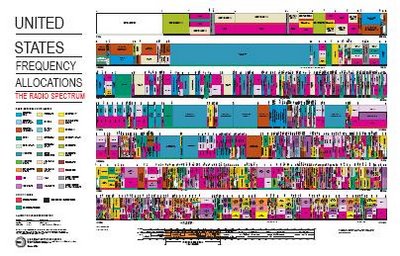
available from
National Telecommunications and Information Administration
My company has Value Added Reseller relationships with several cellular carriers. That is because most digital devices used for Locations Base Services work over the cellular network just as regular cell phones do and thus they need a SIM that is provided and activated by a carrier. A delay in a VAR application to a big carrier caught my attention; The application had been properly filled and submitted weeks ago. However, we received a notice to get in contact with a special Department. The information requested was basic and already included in the application which me made question why this carrier was presenting this additional hurdle.
The answer was provided by the many articles popping in the business and IT publications; 1,122 licenses for a couple of slivers of the US radio spectrum are being auctioned off by the Federal Communications Commission. I suspect that our carrier is involved in these auctions and probably has to disclose or update information about its VAR's.
FCC Auction 66 is also known as Advanced Wireless Services (AWS-1) which "...is the collective term used for new and innovative fixed and mobile terrestrial wireless applications using bandwidth that is sufficient for the provision of a variety of applications including those using voice and data (such as internet browsing, message services, and full-motion video) content..." That has to sound exciting for not just for the gearheads and the geeks but for anyone that has a cell phone.
FCC auctions have always intrigued me. All kinds of new technologies are enabled by the availability of new frequencies, often resulting in revolutionary product and services. Remember when pagers were an essential business gadget? Cell phones evolved from a brick-size device we were willing to lug around just for the sake of instant communication. Today, nobody considers a cell phone unless it fits into a shirt pocket and has a combination of sophisticated built-in gadgets such as a music player, a camera, a video-cam, even a thumb-size keyboard so that we can respond to emails and surf the the net anytime, anywhere.
I think that AWS will result mainly in evolutionary rather than revolutionary products and services. Wireless broadband has been available from the major cellular carriers for a while. They are well on their way, implementing 3G technologies across the US. (And playing catch-up to Asia and Europe where the ubiquitousness of GSM makes the roll-out of new cell phone technologies easier) All the promises of 4G will be undoubtedly be enabled by the availability of the newly auctioned FCC frequencies. Over the last few months, we have seen the introduction of Verizon's VCAST Service that allows the download of music and videos to Verizon phones from LG, Samsung and Motorola. Sprint has similar services but what I find most interesting is that one can now listen to SIRIUS Satellite Radio on a multimedia Sprint phone. This marriage of satellite and wireless is not going to be limited to cellular carriers offering satellite-only services over their networks as the bidding for Auction 66 clearly illustrates. The most aggressive bidders so far has been a group that includes DirectTV and and Echo Star Communications. The analysts believe that the satellite-TV operators do not want to be left out of the multiple service offerings that cellular carriers and cable companies are providing now and will keep on improving with AWS.
So will AWS just mean video bilogging on every cell phone? That's already happening and the blogosphere is using it in some creative ways that will keep on challenging traditional media. What could be really wonderful is if Google and Yahoo finally deliver on their half-hearted efforts (Google WiFi and at&t Yahoo) and actually start delivering their contents on their own backbone in a new innovative way; A good chunk of those AWS spectrum slivers would make that possible!
The other intriguing factor of FCC auctions is all the rags-to-riches stories that are now part of the history of the telecommunications industry. Even today, there seems to be some opportunities in FCC Auction 66, according to Information Week:
"...The FCC has divvied the spectrum into hundreds of rural licenses--rather than a handful of licenses that span large geographic areas--making it easier for smaller providers in remote cities and towns to bid. They also get a financial advantage in the process; smaller providers that bid on spectrum are required to pay just 75% to 85% of their winning bidding price, according to FCC rules, while large providers pay 100% of their winning bids..."
I wonder if anyone has yet bid for the Northern Marianas?

